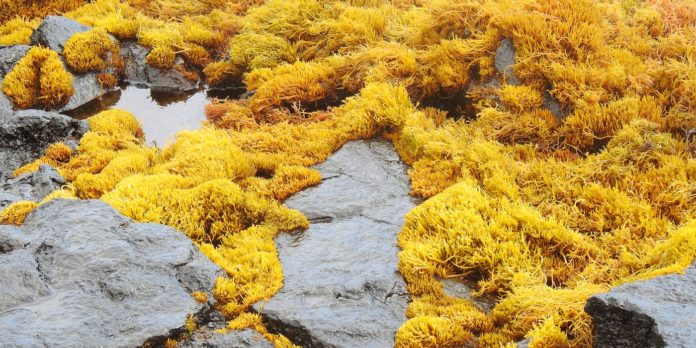What Is Kelp?
Kelp is a big, leafy brown seaweed or algae that develop along rocky coastlines in chilly water. In the words of the National Parks Service, it grows about 1.5 feet daily. Some species can grow to be 150 feet long! Kelp would be the boss of the seaweed world if there was one.
Kelp resembles an underwater tree due to its size. However, in contrast to genuine plants, the water algae in question do not have any roots. On the other hand, Kelp attaches itself to the stony ocean floor and then grows from that point, eventually producing thick clusters referred to as kelp forests.
While certain species are more at home in the northwestern Atlantic Ocean, extending from Baja California to Japan, others thrive in the northern Pacific Ocean. According to Oceana, they can also grow along with Chile, Argentina, South Africa, New Zealand, and Australia coastlines.
Where they may be found? Kelp forests are astonishingly complex ecosystems that provide food and shelter for hundreds of different species of creatures.
Health Benefits of Kelp
Rich in Vitamins
Kelp provides 82 percent of your recommended daily vitamin K intake in just 100 grams, making it an excellent vitamin K source.
Vitamin K is absolutely necessary for your body to have healthy blood coagulation and bone metabolism. Suppose you are currently taking blood thinners like warfarin. In that case, you should be aware that consuming excessive vitamin K can have significant side effects. Before adding Kelp to your diet, you may want to discuss the decision with your physician first.
Kelp is a good source of folate since it provides 180 micrograms, equal to 45 percent of the daily requirement. Folate is essential for pregnant women because it helps prevent birth abnormalities. In addition, Kelp is a good source of B vitamins, riboflavin, pantothenic acid, and thiamine, all of which are necessary for healthy metabolism and energy creation.
Because it is rich in vitamin C (3 milligrams or 5% of the DV per 100 grams) and vitamin E (0.9 milligrams or 4% of the DV per 100 grams), Kelp is an excellent source of antioxidants that are beneficial to your health.
Virus Hepatitis C
Fucoidan, derived from brown seaweed, was administered to 15 patients suffering from chronic hepatitis C to treat virus-related liver disorders. Following treatment for 8 to 10 months, considerably lower levels of the hepatitis C virus (HCV) were found in the blood.
In addition, the levels of a protein called Alanine Aminotransferase were analyzed in this study. This protein’s presence is linked to a more severe HCV infection. Also, Alanine Aminotransferase levels have been shown to drop in the blood tests. Despite the encouraging findings in the laboratory, these tests did not lead to any significant clinical improvements.
Management of Diabetes
People who suffer from type 2 diabetes may benefit from consuming Kelp because it is rich in mineral vanadium. Initial research involving both humans and animals has suggested that it may assist in maintaining normal blood sugar levels.
Before vanadium can be made accessible for purchase, scientists have a lot more questions they need to answer about how it functions in the human body.
Additionally, researchers are looking into fucoxanthin, a compound found in brown algae that has the potential to assist with weight management.
Researchers observed an increase in mice’s synthesis of the omega-3 fatty acid DHA and a protein involved in fat metabolism when fucoxanthin was administered. On the other hand, humans can’t consume enough seaweed to reap these benefits from their diets. This is an area of particular significance for diabetics.
Management of Weight and Obesity
There are a variety of potentially bioactive compounds found in seaweed that are not found in terrestrial plants. These compounds are only found in seaweed and may help fight obesity.
According to the findings of certain studies, these components may either aid in the prevention of weight gain or promote weight loss. According to research published in 2014, a natural fiber called alginate that is generated from Kelp has the potential to prevent fat absorption in the intestines by as much as 75 percent.
The findings were reviewed in the journal Food Chemistry, published concerning the possibility of alginate as an effective dietary fiber for treating obesity.
Blood Pressure
Rats with high blood pressure were given ten different protein extracts from a certain type of sea kelp (wakame). Four of the extracts demonstrated lower blood pressure levels after a single dose and when used regularly.
In a study conducted on cells (Angiotensin-converting Enzyme, ACE), five different organic brown seaweed (kelp) extracts were inhibited by five different organic brown seaweed (Kelp) extracts. This enzyme is frequently a target for the development of medications that lower blood pressure.
Treats and Prevents Anemia
Anemia, which is caused by a lack of iron in the body, can be avoided by eating Kelp, which has a sufficient amount of this mineral. In the condition known as anemia, the tissues of your body do not receive sufficient oxygen because there are not enough red blood cells.
Women who menstruate are at an increased risk of anemia, which can manifest itself in a variety of ways, including exhaustion, weakness, and dizziness.
Fights Cancer
Carotenoids, flavonoids, and alkaloids are just some of the antioxidants that may be found in Kelp. Antioxidants have been shown to help reduce free radicals in the body, which can lead to cancer and other dangerous diseases.
 Researchers have arrived at the conclusion that the consumption of seaweed may be a contributing factor in the low incidence of cancer in Japan and in other nations where a traditional diet includes a significant amount of marine species. Brown seaweed includes a number of compounds that, when extracted, may have anticancer biological properties.
Researchers have arrived at the conclusion that the consumption of seaweed may be a contributing factor in the low incidence of cancer in Japan and in other nations where a traditional diet includes a significant amount of marine species. Brown seaweed includes a number of compounds that, when extracted, may have anticancer biological properties.
In a study that was conducted in 2014, the focus was on utilizing these compounds to examine their ability to impede the progression of cancer, namely colorectal and breast malignancies.
The study concluded, as reported in the journal Marine drugs, that certain medicinal components in Kelp were beneficial in preventing the proliferation of cancer cells. Additionally, the study highlighted the significance of seaweed in the battle against certain types of cancer.
Helps Maintain Healthy Bones
In addition to being an exceptional source of all of the vitamins and nutrients that have been mentioned, Kelp’s true nutritional value lies in the fact that it is one of the best plant-based sources of calcium; in fact, it is a greater source of calcium than the majority of vegetables, including kale.
Calcium intake should not exceed the daily recommended dietary allowance (RDA), which for most adults is 1,000 mg. Raw Kelp contains 168 mg per 100 g serving or 372 mg per 100 gram serving of dry Kelp. Calcium is essential for maintaining normal blood pressure, maintaining the proper muscular function, and developing healthy bones.
Iodine in Kelp
It is recommended that individuals should consume 150 micrograms of iodine on a daily basis as the average quantity. Pregnant or breastfeeding women have a requirement that is increased by 50%.
Iodine intake must be adequate in order to achieve optimal levels of hormone synthesis by the thyroid. According to the Mayo Clinic, having insufficient iodine levels can result in hypothyroidism, which can cause symptoms such as fatigue, depression, weight gain, and an inability to handle cold temperatures.
Iodine insufficiency can induce low IQ in newborns and children, as well as reduced cognitive function in adults. Iodine shortages can also cause goiter. If a pregnant woman doesn’t get enough iodine, there is a risk that the fetus will be permanently harmed, which can include retardation of physical and mental development.
As documented by the National Institutes of Health (NIH), a severe lack of iodine can cause an enlarged thyroid gland, also known as goiter.
Iodine is frequently added to table salt as a measure to assist in warding off the issue of insufficiency. According to Nutra Ingredients-USA, Kelp is one of the best natural food sources of iodine, containing levels that are typically around 700 micrograms per gram.
However, if you are on a low-sodium diet or consume specialty salts that do not contain iodine, Kelp is one of the best natural food sources of iodine.
How Much Is Too Much to Eat?
Even while Kelp has numerous positive effects on one’s health, there is a limit to how much of it one should consume due to its high iodine level. If you have a thyroid issue, an allergy to iodine, kidney illness, or liver disease, you should discuss taking kelp supplements with your physician before beginning treatment.
Although the maximum allowable amount of iodine is 1,100 micrograms, the Food and Drug Administration has determined that the safest amount of iodine to consume in a kelp supplement is not more than 225 micrograms per serving on a daily basis.
It is perfectly safe to consume Kelp as food. However, consuming an excessive amount of iodine from Kelp in the form of Ascophyllum Nodosum supplements might overstimulate your thyroid, leading to inflammation of the thyroid gland and an increased chance of developing thyroid cancer.
 Iodine at very high doses can cause nausea, fever, a weak pulse, or a burning feeling in the throat, mouth, and stomach. Other symptoms may also occur.
Iodine at very high doses can cause nausea, fever, a weak pulse, or a burning feeling in the throat, mouth, and stomach. Other symptoms may also occur.




